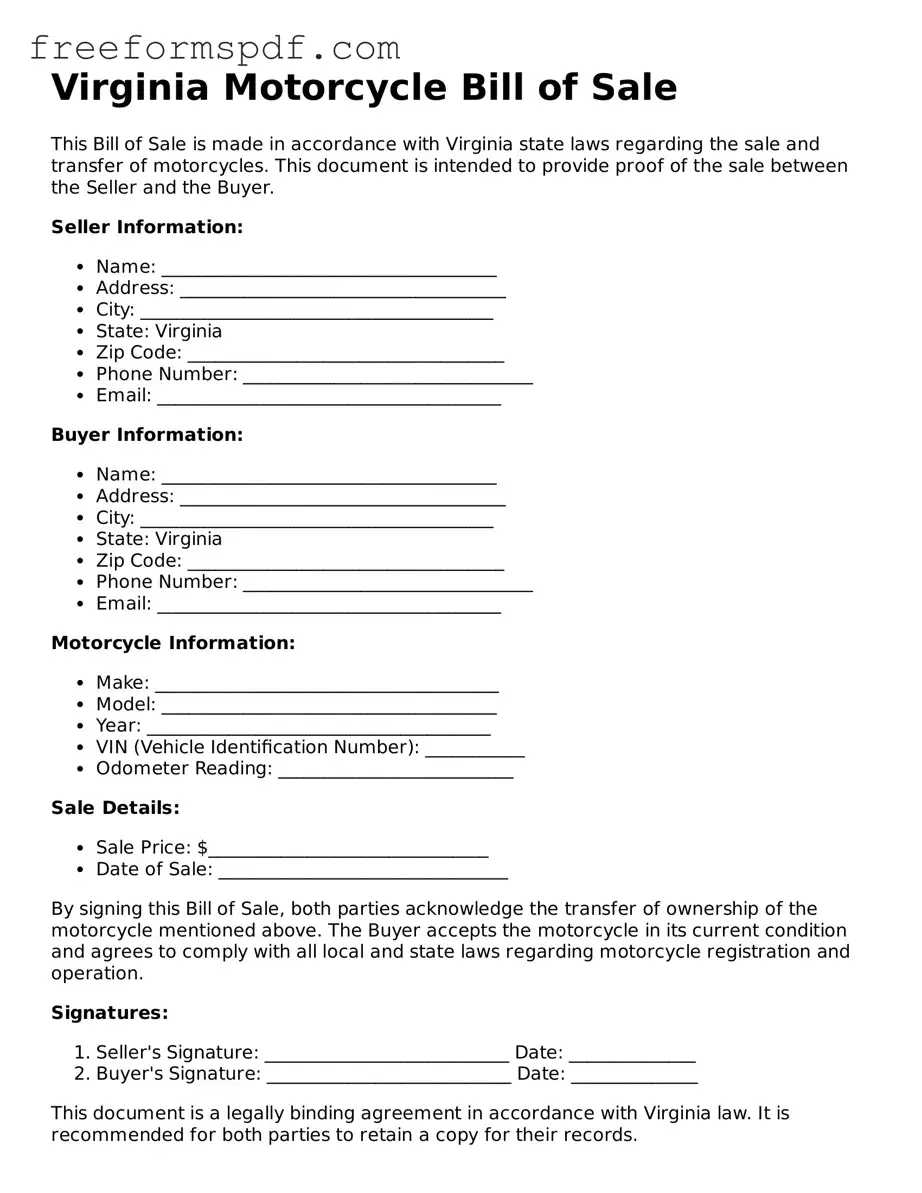Attorney-Verified Motorcycle Bill of Sale Document for Virginia State
Common mistakes
-
Incomplete Information: Failing to provide all required details, such as the buyer's and seller's full names, addresses, and contact information, can lead to complications later on.
-
Incorrect Vehicle Identification Number (VIN): Entering an incorrect VIN can cause issues with registration. Always double-check this number against the motorcycle's title or registration documents.
-
Omitting the Sale Price: Not including the sale price can create confusion and may affect taxes or future ownership verification.
-
Not Signing the Document: Both the buyer and seller must sign the bill of sale. Without signatures, the document is not legally binding.
-
Failing to Date the Document: Not including the date of the sale can lead to disputes about when the transaction occurred.
-
Not Providing a Copy: Forgetting to give a copy of the completed bill of sale to the buyer can lead to misunderstandings about the sale.
-
Using Inaccurate Descriptions: Providing vague or incorrect descriptions of the motorcycle can cause issues in the future, especially if disputes arise.
-
Ignoring Local Laws: Not being aware of Virginia's specific requirements for motorcycle sales can lead to non-compliance. Always check local regulations before finalizing the sale.
Learn More on This Form
-
What is a Virginia Motorcycle Bill of Sale?
A Virginia Motorcycle Bill of Sale is a legal document that records the transfer of ownership of a motorcycle from one person to another. This form includes important details about the transaction, such as the names of the buyer and seller, the motorcycle's identification number, and the sale price.
-
Is a Bill of Sale required in Virginia?
While a Bill of Sale is not legally required in Virginia, it is highly recommended. This document serves as proof of the transaction and can help protect both the buyer and seller in case of disputes. Additionally, it may be needed when registering the motorcycle with the Department of Motor Vehicles (DMV).
-
What information should be included in the Bill of Sale?
The Bill of Sale should include:
- The full names and addresses of both the buyer and seller.
- The motorcycle's make, model, year, and Vehicle Identification Number (VIN).
- The sale price of the motorcycle.
- The date of the sale.
- Any additional terms or conditions agreed upon by both parties.
-
Do I need to have the Bill of Sale notarized?
No, notarization is not a requirement for a Bill of Sale in Virginia. However, having it notarized can add an extra layer of authenticity and may be beneficial if any disputes arise later.
-
What should I do after completing the Bill of Sale?
After completing the Bill of Sale, both the buyer and seller should keep a copy for their records. The buyer will need this document when registering the motorcycle with the DMV. The seller should retain a copy as proof of the sale.
-
Can I use a generic Bill of Sale form for my motorcycle?
Yes, you can use a generic Bill of Sale form as long as it includes all necessary information specific to the motorcycle transaction. However, using a form specifically designed for motorcycle sales may ensure that all relevant details are captured accurately.
Misconceptions
When it comes to the Virginia Motorcycle Bill of Sale form, several misconceptions can lead to confusion. Here are six common misunderstandings:
-
It’s not necessary to have a Bill of Sale for motorcycle transactions.
Many people believe that a Bill of Sale is optional. In Virginia, having this document is crucial as it serves as proof of the transaction and protects both the buyer and seller.
-
The Bill of Sale must be notarized.
Some think that notarization is required for a Bill of Sale to be valid. While notarization can add an extra layer of security, it is not a requirement in Virginia.
-
Only the seller needs to sign the Bill of Sale.
Another misconception is that only the seller's signature is necessary. In reality, both the buyer and seller should sign the document to ensure that both parties agree to the terms of the sale.
-
The Bill of Sale is the same as the title.
Some people confuse the Bill of Sale with the motorcycle title. While both documents are important, the title proves ownership, while the Bill of Sale documents the transaction.
-
It doesn’t matter what information is included in the Bill of Sale.
This is a common error. The Bill of Sale should include specific details such as the motorcycle's make, model, year, VIN, and sale price to be effective and useful.
-
You can’t use a generic Bill of Sale template.
Many believe that they must create a Bill of Sale from scratch. However, using a template is perfectly acceptable as long as it includes all the necessary information.
Understanding these points can help ensure a smooth motorcycle transaction in Virginia. Always double-check the details and requirements to avoid any complications.
Some Other Motorcycle Bill of Sale State Templates
Bill of Sale Sample - Acts as a tool for record-keeping by both buyer and seller.
To ensure your healthcare choices are appropriately represented, it's important to understand the implications of designating a trusted individual through a Medical Power of Attorney form. For more information, you can visit our resource on the various aspects of the Medical Power of Attorney in Arizona here.
Example Bill of Sale Car - Can be used for private or dealer transactions.
Oregon Bill of Sale - Essential for keeping transparent records of motorcycle ownership history.
